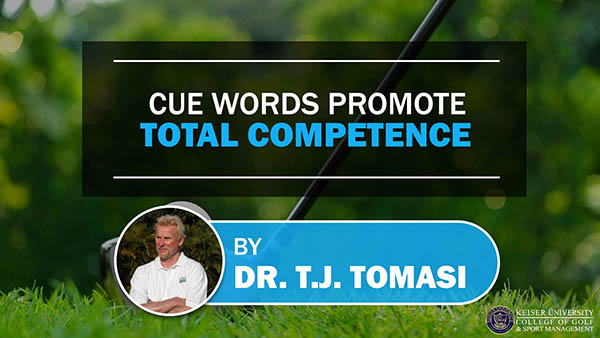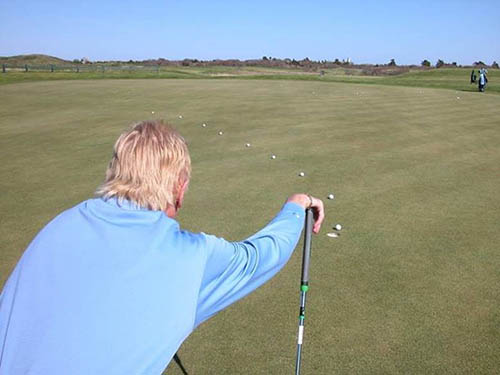Cue Words Promote Total Competence

by Dr. T. J. Tomasi, Keiser University College of Golf Senior Faculty and Director of Research
Once you arrive at the memory state called Unconscious Competence, where you can do something like hit a golf ball without thinking about it, you then begin preparation for the last stage on the performance ladder called Total Competence.
- Unconscious incompetence (Ignorance)
- Conscious incompetence (Awareness)
- Conscious competence (Learning)
- Unconscious competence
- Total competence. This is a state where you are the perfect combination of automatic reaction and deliberative intervention.
“Athletes operating at this level,” say psychologists John Toner and Aidan Moran at England’s University of Hull, who have studied performance among elite athletes, “are driven by the desire to learn new and better techniques. Clearly, certain forms of conscious processing are a common feature of elite competitive performance.” This also applies to those who are injured or aging or, for some other reason, have lost their competitive edge and need new and better techniques. Thus, the elite performer finds the right mix between habit and adaptation, script, and improvisation. Elite athletes are a composite: a combination of robotic skill, wily variation, and timely intervention.
A prime example of how to operate in Total Competence is the use of two cue words — “process” and “spot” — by Rory McIlroy when he won the British Open at Royal Liverpool.
McIlroy said, “With my long shots, I just wanted to stick to my ‘process’ and stick to making good decisions, making good swings. ‘Spot’ was for my putting. I was just picking a spot on the green and then trying to roll it over my spot every time.”
McIlroy made sure he repeated these two words before each routine, an intervention that assured access to previously learned techniques and adaptation to changing conditions. Here you can see the effectiveness of simple triggers that activate already learned capabilities. It would do Rory no good to think of picking a spot if he didn’t do all the intermediate steps necessary to be a good putter. Once he was in competition, he used a trigger word to ensure that he had (1) access to his former learning and (2) was in the moment sufficient to make on-site modifications that are needed due to the novelties present in each new shot.
This duality is the essence of the final stage of competency, where the athlete is on semi-autopilot while staying alert to the exigencies of each new situation. Hence the adage: You never play the same golf course twice.
Takeaway:
Once you have been through the learning process, you are ready for the final stage — total competence — where small, seemingly simple adjustments work wonders when coupled with capabilities already stored in your unconscious competence.

I’m looking for my spot, and once I find it, all I have to do is get the speed right to have my best chance to make it.
If you’d like to study with Dr. Tomasi and other PGA Master Professionals, contact The College of Golf today.














